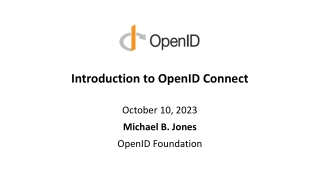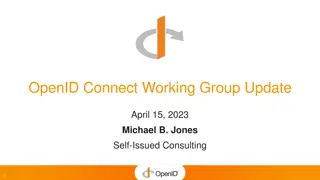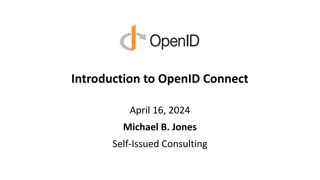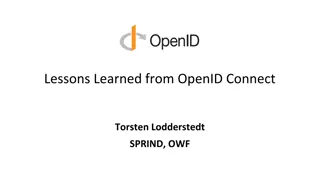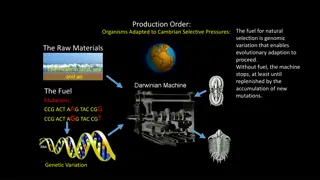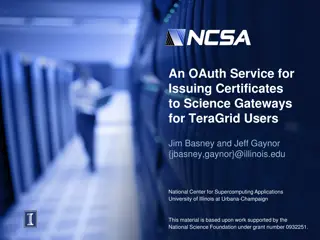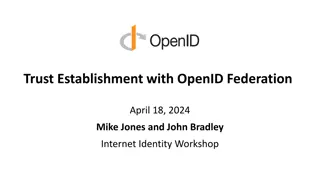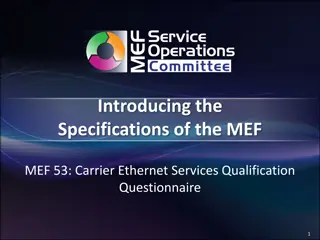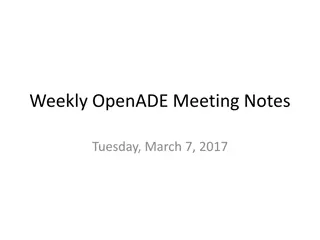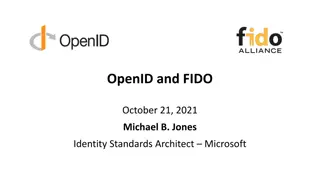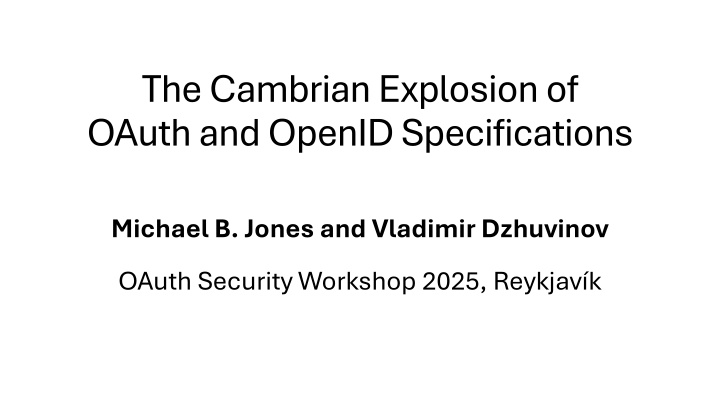
The Cambrian Explosion of OAuth and OpenID Specifications
Explore the Cambrian Explosion in Internet and Web standards, paralleling the sudden diversification of life during the Cambrian period. Delve into the complexities and abundance of OAuth and OpenID specs, reflecting on challenges and strategies faced by developers and standards bodies.
Download Presentation

Please find below an Image/Link to download the presentation.
The content on the website is provided AS IS for your information and personal use only. It may not be sold, licensed, or shared on other websites without obtaining consent from the author. If you encounter any issues during the download, it is possible that the publisher has removed the file from their server.
You are allowed to download the files provided on this website for personal or commercial use, subject to the condition that they are used lawfully. All files are the property of their respective owners.
The content on the website is provided AS IS for your information and personal use only. It may not be sold, licensed, or shared on other websites without obtaining consent from the author.
E N D
Presentation Transcript
The Cambrian Explosion of OAuth and OpenID Specifications Michael B. Jones and Vladimir Dzhuvinov OAuth Security Workshop 2025, Reykjav k
The Cambrian Explosion an interval of time beginning approximately 538.8 million years ago in the Cambrian period of the early Paleozoic, when a sudden radiation of complex life occurred and practically all major animal phyla started appearing in the fossil record. It lasted for about 13 to 25 million years and resulted in the divergence of most modern metazoan phyla. Wikipedia
The Cambrian Explosion of Specifications We currently have a Cambrian explosion in Internet and Web standards. Things looked a way simpler and easier to grasp 11 years ago when I had my first experience with the OpenID Connect WG. Vladimir Dzhuvinov, August 2023 There are too many OAuth specs. (paraphrased from memory) Tony Nadalin, July 2016, IETF 96, Berlin
Quantifying the Explosion (final and near-final specs) 31 OAuth specs 13 JOSE & JWT specs 13 OpenID Connect specs 2 other related IETF specs used by OpenID Connect 5 FAPI specs 1 MODRNA spec 3 eKYC-IDA specs 4 SecEvent specs 4 Shared Signals specs 9 Wallet specs 11 COSE specs 2 Passwordless Login specs 3 Zero-Knowledge Proof specs 101 OAuth & OpenID-related specs! And more on the way 12 active OAuth WG specs, etc.
Whats a developer to do? Tony Nadalin tried to stop things Failed to stop PKCE Delayed OAuth Resource Metadata for 8 years (now in RFC Editor queue) Companies implementing carefully curated sets of specs Implement closely-related specs in libraries, platform offerings With extensibility points enabling the use of more E.g., RAR may not be directly supported, but can be used by applications
Thoughts on stopping things People create new specs to scratch their own itches Advocates are often enthusiastic Not easily deterred Just because I don t need something, it doesn t make them wrong Stopping things is hard Takes far more energy to oppose new work than to let it happen As a result, new things keep being added Overall, a sign of a healthy body of work
Fear of not stopping things If they create a spec to do X, customers will ask me to support it! Anonymous OSW 2025 attendee The ever-increasing combinatorial combinations of specs creates a complexity nightmare. Me, during discussions with implementers leading up to OSW
Extensibility paved the road to the explosion The authorization server MUST ignore unrecognized request parameters. The client MUST ignore unrecognized response parameters. RFC 6749 All claims that are not understood by implementations MUST be ignored. RFC 7519
We eagerly sought builders perspectives I appreciate these conversations Vladimir and I had in preparation Taka Kawasaki and Joseph Heenan of Authlete Brock Allen, Dominick Baier, and Joe DeCock of Duende Software Trevor Thompson and Aaron Parecki of Okta Brian Campbell and David Waite of Ping Identity
Perspectives from these conversations We can't build everything. Sometimes we implement things to see if they make sense. It s hard to know the impact of proposed specs at the time. Saying "no" in standards is wildly useful and little appreciated. It's very hard. Be aware of how new spec proposals interact with existing data models. New specs can cut across and invalidate architectural layering. Implementing even simple new things means fitting into spaghetti. General-purpose RAR implementations don't make sense.
Were here to have a conversation with you I certainly don t have all the answers Your turn!

